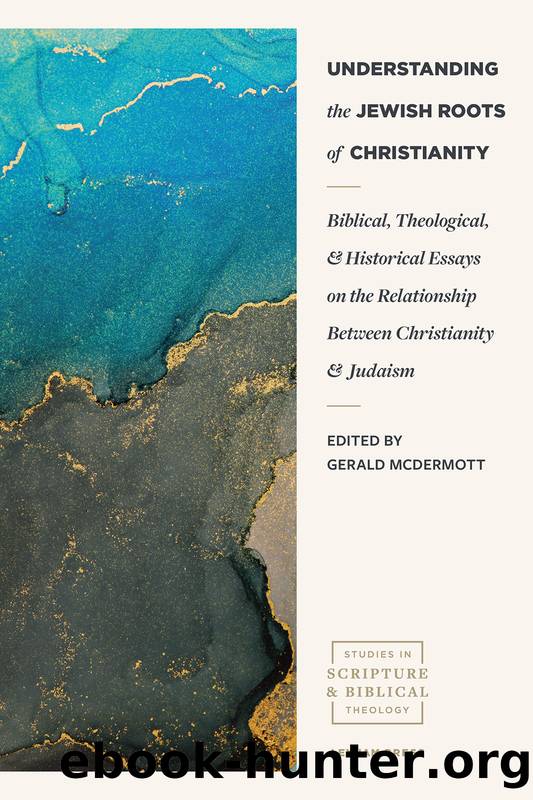Understanding the Jewish Roots of Christianity by Gerald McDermott;

Author:Gerald McDermott;
Language: eng
Format: epub
Tags: Christianity--Origin., Church history--Primitive and early church, ca. 30-600.
Publisher: Bellingham, WA
Published: 2021-06-15T00:00:00+00:00
DID SOMETHING GO WRONG?
For Christians who esteem the Jewish tradition, it is self-evident that at a certain point or points in her history the ekklÄsia took a wrong turn. Her proper consciousness of her own election expanded to include an improper judgment concerning genealogical Israelâs rejection. But this wrong turn can be understood in two different ways. The first accepts the separation of the two communities as a necessary, providential, and irreversible historical development. Many of the attitudes and behaviors that accompanied this differentiation were sinful, but the differentiation itself was divinely ordained. Such a perspective on the separation is commonly held by Christians engaged in Jewish-Christian dialogue, since it poses no threat to the current identities of each dialogue partner.
Philip Cunningham, a leading Catholic authority on Jewish-Christian relationships, articulates the position clearly:
I think most Christians and Jews unthinkingly assume that âsomething went wrongâ with the parting of the waysâthe origins of Christianity and rabbinic Judaism as separate communities. This separation is thought to have been contrary to Godâs will.⦠I suggest an alternative presupposition to âsomething went wrongâ in retelling the Christian story today. Why can we not suppose that the origins of our two traditions unfolded according to Godâs will?2
Thus, God wills that the ekklÄsia be âa Gentile assembly rooted in Israelâs story.â3 On one side stands the genealogical descendants of the biblical patriarchs and matriarchs; on the other side stands a community of gentiles who share in the Jewish spiritual inheritance. This was the divine purpose all along.
The main problem with this construal is christological: it suggests that Jesus has no significance for the Jewish people apart from the creation of a new gentile assembly rooted in Israelâs story. Jesus may still have significance for individual Jews who accept his claims, but they then become part of a âgentile assembly,â and so presumably leave their Jewish identity behind. The Jewish people, on the other hand, continue on as they did before, untouched in their corporate life by the death, resurrection, and ascension of Jesus. This is a strange way of construing a message concerning one who died with the words âKing of the Jewsâ inscribed above his head, and whose name became forever linked to Israelâs royal title âChristos/Messiah.â4 But this christological problem also has ecclesiological consequences: if the story of Jesus has no significance for the Jewish people as a people, then the resurrected Jesus has no particular point of ongoing contact with his own kin beyond what he has with all human beings, and so also has no such point of contact to offer the âgentile assemblyâ gathered in his name.
The second approach to the wrong turn challenges the necessity of the separation itself. Christians who take this approach view the parting as a tragic schism rather than a providential differentiation. As Hans Urs von Balthasar puts it, âWhat providence intended was the unity of the two peoples, not the rift between them, the schism.⦠The divorce which uprooted the young Church from its mother-soil
Download
This site does not store any files on its server. We only index and link to content provided by other sites. Please contact the content providers to delete copyright contents if any and email us, we'll remove relevant links or contents immediately.
| Baha'i | Cults |
| Demonology & Satanism | Eckankar |
| Egyptian Book of the Dead | Freemasonry |
| Messianic Judaism | Mysticism |
| Scientology | Theism |
| Tribal & Ethnic | Unitarian Universalism |
The Four Agreements by Don Miguel Ruiz(5533)
Breaking Free by Rachel Jeffs(3631)
The Hatha Yoga Pradipika (Translated) by Svatmarama(2500)
120 Days of Sodom by Marquis de Sade(2447)
Member of the Family by Dianne Lake(2035)
The Tao of Physics by Fritjof Capra(1858)
The Psychedelic Gospels: The Secret History of Hallucinogens in Christianity by Jerry B. Brown(1829)
The Road to Jonestown by Jeff Guinn(1745)
Uriel's Machine by Christopher Knight(1626)
Going Clear by Lawrence Wright(1575)
Going Clear: Scientology, Hollywood, and the Prison of Belief by Lawrence Wright(1574)
The Grand Grimoire: The Red Dragon by Author Unknown(1419)
The Gnostic Gospel of St. Thomas by Tau Malachi(1414)
Key to the Sacred Pattern: The Untold Story of Rennes-le-Chateau by Henry Lincoln(1352)
The Malloreon: Book 02 - King of the Murgos by David Eddings(1310)
Waco by David Thibodeau & Leon Whiteson & Aviva Layton(1298)
The New World Order Book by Nick Redfern(1260)
The Secret of the Temple by John Michael Greer(1223)
The Initiatory Path in Fairy Tales by Bernard Roger(1180)
